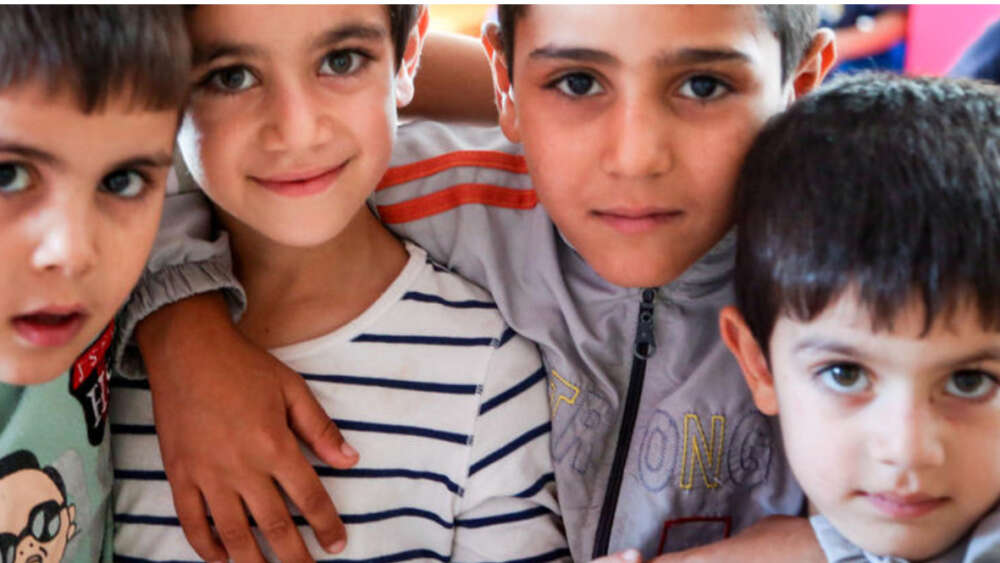'Please. Stop the war. Let us return to our homes' say Syria's kids
‘Help us build schools, hospitals and houses for ourselves. Let us play and live in peace, by ending war.’
Children can be astoundingly resilient but in Syria they have faced ten long years – about 3,653 days – of relentless injury, death and destruction. Thanks to a decade of civil war between the government and various rebel groups, they have lost their education, safety, family income and their hope in a peaceful future.
Today, Syria is one of the worst places in the world to be a child. Around 600,000 people, including 55,000 children, have been killed, half the population displaced, and a child’s life expectancy has been reduced by 13 years.
“The brutal reality is that we have lost a generation.” – Syria report
So reads a devastating report – Too High a Price to Pay: The Cost of Conflict for Syria’s Children – released today by World Vision, in partnership with Frontier Economics.
“The brutal reality is that we have lost a generation. Young people who lived through ten years of war as refugees in Lebanon and Jordan, and those displaced in North West Syria, told us they felt that there was little hope for their future,” reads the new report.
The report investigates the impact that a decade of war has had on Syria’s economic growth and on its human capital, with a special focus on Syria’s children. It indicates that children will bear the cost through lost education and health, preventing many from supporting the country’s recovery and economic growth once war ends.
The economic cost is estimated to be more than $AU1.55 trillion. Tragically, the report also found that even if the war ended today, its cost will continue to accumulate to the tune of an extra $AU2.19 trillion (in today’s money) through to 2035.
The economic findings are accompanied by a World Vision survey of almost 400 Syrian children and young adults in Syria, Lebanon and Jordan, revealing the harrowing human costs of conflict.
“The world has stood by and allowed this conflict to rage for ten years, robbing children of basic rights and preventing an entire generation of girls and boys from reaching their potential,” said World Vision Australia CEO Daniel Wordsworth.
“I have met children, the victims of this conflict, whose lives have been shattered – loved ones killed, girls and boys out of school, begging on the streets and facing new threats of violence in the places they have fled to.”
World Vision’s assessments in North West Syria found that every girl interviewed lives with the fear of rape and sexual assault.
Child marriage – which can result in significant physical and psychological harm and abuse – has also increased to an alarming level.
All children interviewed appealed for one thing: peace.
“You should have asked if there is anything that isn’t scaring or worrying me! But being uneducated scares me the most, as well as having an unknown future in an unknown destination,” says Lara, a 17-year-old Syrian girl in Lebanon.
“Boys and girls aged five or six can name every type of bomb by its sound, but sometimes can barely write their name” – Johan Mooij, Director of World Vision Syria Response.
The report confirms the findings of the 2016 Cost of Conflict report by World Vision and Frontier Economics that warned of a total economic cost of more than $AU355 billion, projecting – in a worst-case scenario – to reach $AU1.68 trillion by 2020.
The latest research shows the aid agency’s worst fears have been realised.
“Children come to us on a daily basis in Syria, hungry, cold and deeply distressed by what they have witnessed and experienced,” says Johan Mooij, Director of World Vision Syria Response.
“Boys and girls aged five or six can name every type of bomb by its sound, but sometimes can barely write their name, having missed out on the chance of an education. We cannot let them remain trapped in this cycle of violence. We must stop the war and the shadow pandemic of violence against children before it is too late,” Mooij said.
Too High a Price to Pay: The Cost of Conflict for Syria’s Children states that peace, accompanied by an inclusive political solution to the crisis, is the only way to avoid further economic and human costs. Without it, Syrian children will continue to pay the price for adult failures.
Wordsworth added that a peace that lasts was the only viable solution for Syria’s children.
“The world has a moral responsibility to do everything in its power to make this happen. The economic costs are devastating, and children continue to pay the price. We need political will, financial support, and a collective passion for peace and security.”
“We must act now to bring hope.”



